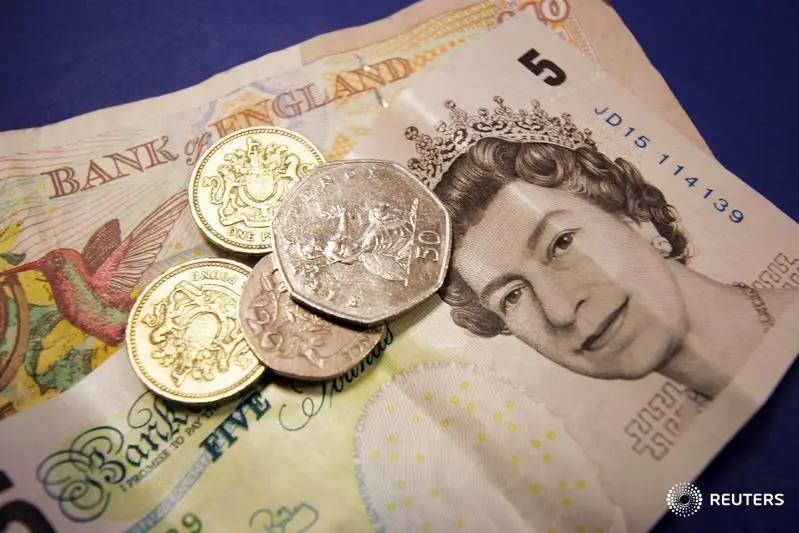PHOTO
The pound gained for a third day on Monday and was on track for its largest monthly rise versus the dollar in a year, largely a result of investors ditching the greenback ahead of what many believe will be a rapid shift to U.S. rate cuts in 2024.
Separately, in a potential longer-term boost for sterling, Prime Minister Rishi Sunak announced a raft of foreign investments in Britain ahead of a gathering of business leaders.
Sterling has gained nearly 4% versus the dollar this month, but has fared less well against the euro or the Chinese yuan, with declines in November of 0.3% and 3.6%, respectively.
On a trade-weighted basis, the pound is heading for its first monthly gain since June.
Money market traders expect the Bank of England to keep interests higher for longer than either the Federal Reserve or the European Central Bank in 2024, which has helped give sterling an edge recently.
Less than two weeks ago, traders had priced in around 70 basis points in UK rate cuts next year. Following a number of data releases including business activity and inflation, that expectation has been brought back to around 60 bps.
"The developments should help to provide more support for the pound in the near-term in so far as short-term yield spreads are moving back in favour of the UK. However, we remain sceptical that the recent upward adjustment for UK rates will be sustained," MUFG strategist Lee Hardman said.
Sterling was last up 0.15% at $1.2624, nearing three-month highs, and was flat against the euro at 86.77 pence.
BoE Governor Andrew Bailey said in an interview published on Monday that getting inflation down to the central bank's 2% target will be "hard work" as most of its recent fall was due to the unwinding of the jump in energy costs last year.
"Governor Andrew Bailey already seems to be playing around with language on forward guidance, where restrictive monetary policy will be retained for an 'extended period' or, most recently, 'for quite some time'," ING strategist Chris Turner said.
SUNAK FLAGS INVESTMENT
Meanwhile, Sunak, who is hosting global executives this week outside London in his bid to restore the country as Europe's top foreign direct investment (FDI) destination, announced 29.5 billion pounds ($36.76 billion) of private-sector investments in Britain on Monday.
Years of political churn - with five prime ministers and a non-stop ministerial carousel since the 2016 Brexit vote - have shaken Britain's reputation for stability among investors.
Accountancy firm EY estimates total FDI projects into Britain fell by 6.4% to 929 last year, putting it second in Europe behind France on 1,259. It slipped to third for perceived attractiveness, behind Germany and France.
Britain has changed course on key policies including its rate of corporation tax, its net zero timetable, a major high-speed rail project and its offshore and onshore wind policies.
In a note earlier this month, Deutsche Bank head of G10 currency strategy Alan Ruskin laid out the extent to which FDI has declined in Britain.
Net FDI flows as a percentage of gross domestic product is running at -3.5% in the UK in the fourth quarter. This isn't the biggest net outflow among the world's wealthiest economies - that goes to Sweden with -3.8%. But it is the worst relative to its 10-year average of a net inflow of 1.7%. This includes Russia, where net FDI flows as a percentage of GDP are averaging -1.2% in the fourth quarter versus a 10-year average of -0.6%, according to Deutsche Bank's numbers.
"Relative to trends over the past two decades, the UK has shifted from a sizable net recipient of FDI to a net exporter," Ruskin said in a note dated Nov 13.
"There is now some persistence to the net FDI deficit over the last three years and weaker FDI project numbers since 2017, that will add to concerns that they relate to Brexit."
(Reporting by Amanda Cooper; Editing by Christina Fincher)





















